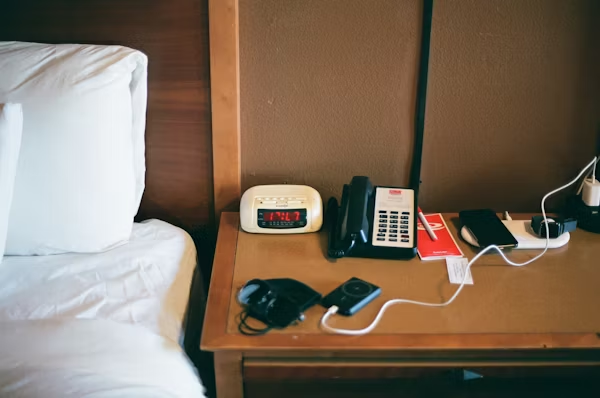1,380 words • 7-minute read
You open your eyes, and within seconds, your hand reaches for your phone. Before you’ve even fully woken up, you’re scrolling through emails, checking social media, reading the news, and responding to messages. Sound familiar? You’re not alone—studies show that 80% of smartphone users check their device within 15 minutes of waking up.
But what if this seemingly harmless habit is sabotaging your entire day?
What Happens When You Check Your Phone First Thing
When you wake up, your brain transitions from deep sleep through lighter sleep stages before reaching full alertness. This transition period is crucial—your mind is moving from the subconscious to the conscious, and you’re in a highly suggestible state.
Checking your phone immediately means you’re allowing external influences to shape your mental state before you’ve had a chance to center yourself.
The Cortisol Connection
Your body naturally experiences a cortisol awakening response, where cortisol levels spike within the first 30-60 minutes of waking. This is healthy and helps you feel alert. However, when you add the stress of emails, news, and social media to this natural cortisol increase, you’re creating an excessive stress response.
Reactive vs. Proactive Mindset
When you check your phone first thing, you immediately put yourself in reactive mode. You’re responding to other people’s priorities rather than setting your own. This reactive mindset can persist throughout the day.
Attention Hijacking
Your phone is designed to capture and hold your attention. What starts as “just checking one email” easily turns into 30 minutes of scrolling.
The Benefits of Phone-Free Mornings
1. Reduced Anxiety and Stress
Multiple studies have shown a direct correlation between smartphone use and anxiety levels. By avoiding your phone for the first hour, you protect your mental state during its most vulnerable period.
2. Improved Focus and Productivity
When you don’t fragment your attention first thing in the morning, you preserve your cognitive resources for important tasks. Research shows that even brief attention switching can significantly reduce your ability to focus for hours afterward.
3. Better Mood and Emotional Regulation
Without the emotional rollercoaster of news, emails, and social media first thing in the morning, you have the opportunity to establish a positive emotional baseline for your day.
4. Increased Sense of Control
Perhaps the most significant benefit is the psychological shift from feeling controlled by technology to feeling in control of your own life.
5. More Time for What Matters
A phone-free morning opens up space for activities that actually nourish you: meditation, exercise, journaling, reading, having a real conversation, or simply enjoying your coffee in peace.
How to Implement the 1-Hour Rule
Start Tonight
The key to phone-free mornings actually begins the night before. Charge your phone outside your bedroom, or at least far enough from your bed that you can’t reach it without getting up. If you use your phone as an alarm, invest in a basic alarm clock instead.
Create a Morning Alternative
Don’t just remove your phone habit—replace it with something positive. Plan what you will do during that first hour instead:
- Morning meditation or deep breathing
- Gentle stretching or yoga
- Journaling or morning pages
- Reading a physical book
- Enjoying breakfast mindfully
- Exercise or a morning walk
Set Clear Boundaries
Communicate your new boundary to people who might need to reach you in true emergencies. Let them know you won’t be responsive during the first hour of your day.
Start Small If Needed
If one hour feels overwhelming, start with 15 minutes and gradually increase. Even 15 phone-free minutes in the morning is better than checking it immediately.
Overcoming Common Obstacles
“But I Need to Check for Urgent Messages”
Ask yourself: How often is there truly an urgent message that can’t wait one hour? Most things that feel urgent aren’t actually time-sensitive enough that one hour makes a difference.
“I’ll Miss Important News”
The news will still be there an hour later. And honestly, most news doesn’t require immediate awareness or action from you.
“It’s My Only Quiet Time”
That’s exactly why you shouldn’t fill it with the chaos of digital content. Use that quiet time for actual rest and restoration, not digital stimulation.
What to Expect
The first few days will feel uncomfortable. You might experience FOMO (fear of missing out) or feel phantom vibrations. This is normal—your brain has been conditioned to expect that dopamine hit from your phone.
By the end of the first week, most people report feeling calmer and more in control. After two weeks, the new habit starts to feel natural. After 30 days, many people say they can’t imagine going back to checking their phone first thing.
The Bigger Picture
Phone-free mornings aren’t just about avoiding technology—they’re about reclaiming agency over your attention and your day. They’re about choosing to be present in your own life rather than immediately diving into everyone else’s.
In a world that constantly demands your attention, protecting the first hour of your day is an act of self-care and self-respect. It’s saying that your peace, your mental health, and your priorities matter more than immediate responsiveness to digital demands.
Tomorrow morning, when you wake up, resist the urge to reach for your phone. Give yourself the gift of one phone-free hour. Your mind, body, and spirit will thank you.
